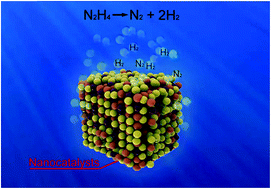Hydrous hydrazine (N2H4·H2O) is a promising hydrogen storage material for fuel cells due to its high hydrogen content and easy transportation and storage, while N2 is the only by-product if it is completely decomposed. In the past two decades, in response to global clean and sustainable energy strategies, nanocatalysts for the decomposition of hydrous hydrazine with high selectivity for hydrogen production were intensively studied. This article reviews the recent advances in nanocatalyst design, synthesis and applications in hydrogen generation from hydrous hydrazine decomposition. Metallic nanoparticles, metal–metal oxides, and supported catalysts as well as the strategies for promoting H2 selectivity are comprehensively reviewed and discussed. Future research prospects in this field are proposed.
